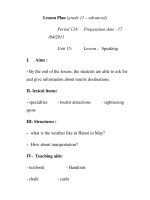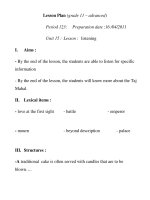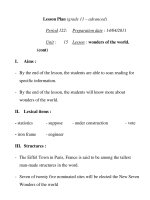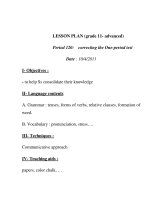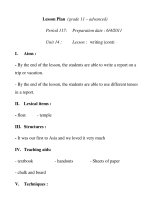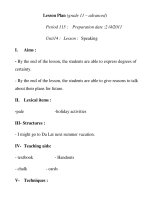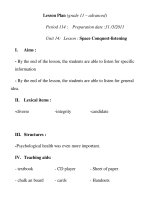Lesson Plan (grade 11 – advanced) Period 118 pdf
Bạn đang xem bản rút gọn của tài liệu. Xem và tải ngay bản đầy đủ của tài liệu tại đây (22.28 KB, 8 trang )
Lesson Plan (grade 11 – advanced)
Period 118: Preparation date :8 /4/2011
Unit14 : Lesson : Language Focus- grammar
I. Aims :
- By the end of the lesson, the students are able to make compound
nouns with the words space and air.
- By the end of the lesson, the students are able to distinguish and
use can, could and be able to.
II. Lexical items :
-persuade - foggy - disturb - stuck
III. Structures :
- Joe can speak four languages.
- We were able to persuade them at last.
IV. Teaching aids:
- textbook - handouts - pieces of paper
- chalk and board
V. Techniques :
- Grammar-based (Can, could, and be able to)
VI. Procedures :
State/ti
me
Teacher’s and students’ activities Blackboa
rd
Mate
rials
1.
warm-
up
(7’)
Game: Hot Seat
-Divide SS into 2 groups ,A and B.
-Choose one representative from each
group to sit in the “hot seat” in the front
with their backs to the board.
-Write a word on the board and ask the
groups to explain what the word is so that
their team mate in the “hot seat” can guess
the word.
-Tell SS they must not say the word,
translate the word or use gestures.
-Give one point to the first group to
-
Pictur
es
-
chalk
and
board
successfully guess the word. And continue
with a new word.
-The group with more points wins the
game.
-Keep a running total of points for each
group on the board.
-Declare the winner.
These are the words used in the game:
Moon NASA Yuri Gagarin
Plane airport spaceman
-Write the words plane, airport, and
spaceman on the board.
-Ask SS to give other words for plane.
-Elicit from SS the word class or part of
speech of these words.
( expected : they are nouns
Transition:
Unit 14
Language
Focus
-Yes, these are nouns are formed by two
words together, so they are called
compound nouns, part of the lesson today
will focus on compound nouns space and
air.
- T writes down on the board :
2.
word
study
(12’)
Compound Nouns:
- elicit from SS the formation, meaning and
stress pattern of the worlds.
- the meanings of these compounds take the
meanings of both elements of the
expressions.
- like most compound nouns, these
compounds have the main stress on the first
part.
Activity 1 Matching to make compound
nouns (task a, p197)
-Ask SS to complete each of the sentences
with a noun from the table in task a or a
Formatio
n:
Space
+
noun
Air
a)Answer
s:
-
textb
ook
-
Chalk
and
board
3.
Gram
mar
(2’)
correct form of the verb given in the box.
-Tell SS to compare answers in pairs.
-Call on SS to read their completed
sentences and check the answers with the
whole class.
Activity : gap-filling (task b, p197)
- Ask SS to read the sentences and fill in
each space with a suitable word from the
list
- Tell SS to compare answers in pairs and
then go over the answers with the whole
class.
Can , could and be able to:
- elicit from SS sentences with can, could
and be able to and then distinguish between
these structures.
- sentence structure with can and be able to
+ infinitve: in the present tense, be able to
1.
spaceman,
space
shuttle,
space suit,
space
walk,
2. airline,
airplane,
air bed,
airsick
b)
answers:
1.
spaceman
2. airsick
3. space
shuttle. 4.
space suit
Textb
ook
is more formal and less usual than can
- we always use be able to , not can in
these structures: to-infinitive, after a modal
verb, present perfect.
- sentence structure with couldn’t and was /
were able to….: we use could or was / were
able to for general past ability or
opportunity in the past.
To say that the ability or opportunity
resulted in a particular action, something
that really happened ( specific past action) ,
we use was/ were able to but not could
We can use either form in negative
sentences or questions : couldn’t or wasn’t/
weren’t able to
We normally use could ( not was/ were
able to) with verbs the senses ( see, smell,
taste , hear…) and verbs of thinking (
understand, ….)
Activity 1 : conversation completion
5. air bed
(task a, p.198)
- Ask SS to read the sentences in the task
and rewrite them using the passive
structure.
-Tell SS to work with a partner and
compare answers.
-Call on SS to write their sentences on the
board and check with the class.
Activity 2: error recognition
- give each student a handout
- tell SS that some of the sentences are
correct and some are in correct.
- Ask SS to correct the incorrect sentences
and check the correct ones
.
4.
Home
work
Sentence Completion
-Give out handouts and SS to look at the
information about the two restaurants and
Hand
out
(1’) complete the sentences
